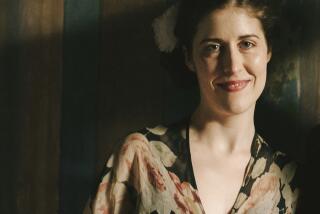‘The Lieutenant: A Novel’ by Kate Grenville
The Lieutenant
A Novel
Kate Grenville
Atlantic Monthly Press: 308 pp., $24
About the early encounters between Europeans and the Other -- non-white, non-Western peoples -- the late Polish foreign correspondent Ryszard Kapuscinski observed that “the Other is a looking glass in which I see myself and in which I am observed -- it is a mirror that unmasks and exposes me, something we would prefer to avoid.”
In her latest novel, award-winning Australian author Kate Grenville uses more than a metaphorical mirror to memorably dramatize the early encounters between Europeans and Aborigines. Scientific instruments of discovery (telescope and sextant, mathematics and linguistics) freshen up “The Lieutenant,” a novel that is a prescriptive plea for cultural understanding and draws revelatory connections between emotional empathy and scientific discovery. Time and space turn out to be an educative form of the Other as well.
The novel’s protagonist, Daniel Rooke, is based on a historical figure, William Dawes, an astronomer, mathematician and master of languages who accompanied the British First Fleet on its sea voyage to New South Wales in 1788. There, 2nd Lt. Dawes befriended (and perhaps became the lover of) a 15-year-old Aborigine girl, meticulously recording in his notebooks the vocabulary he learned from her. Unhappy with the British treatment of the indigenous people, Dawes left the service, becoming a lifelong crusader against slavery. His career has inspired many multicultural parables, including Thomas Keneally’s novel “The Playmaker.” By telling the story from Rooke’s viewpoint, Grenville confronts dogged empiricism with the primal astonishment engendered by a new world, “a place so strange it took a layer off a man and left him peeled.”
The novel’s early chapters underline the irony that Rooke’s intellect turns him into a vulnerable Other in his homeland. A child from a lower-class family, his obsession with mathematics transforms him into a socially awkward outsider. His sister’s affection helps compensate for Rooke’s mistreatment by snobbish fellow students at the Portsmouth Naval Academy, where he’s sent after displaying his scientific talent. Having a head that teems with numbers may isolate the prodigy, but the power of abstraction also liberates Rooke from conventional moral and religious beliefs. “To think mathematically was to feel the action of God in oneself,” muses the young math whiz, concluding that “whatever he was, he was part of a whole, one insignificant note within the great fugue of being.”
For Grenville, scientific curiosity and social marginalization (rather than Christian brotherhood) generates Rooke’s open-mindedness when he becomes an astronomer and navigator on the Sirius, bound for New South Wales. The tragicomedy of the first meeting between the natives and the British repels Rooke: An officer communicates British superiority by firing a gun at a wooden shield. Grenville explores the ways in which the British and Aborigines misinterpret each other (the impatient natives see the English as visitors who overstay their welcome), but she leaves no doubt that the West introduces the poisons of violence and cruelty to that land.
Grenville also satirizes how the British use literature to assert their ownership of history. Rooke’s friend, Lt. Silk, jots down notes for what he hopes will become a bestselling volume of melodrama. Rooke treasures the unusual; Silk fashions the exotic into the familiar. The need of the colonizers to shape reality takes a sinister turn when, after an Aborigine kills a man, Silk and Rooke are ordered to “punish” the natives, a mission that may require beheadings.
For Rooke, vengeance isn’t an option once he befriends the bright young Aborigine girl Tagaran, who teaches him some of the tribe’s language and customs. Grenville nimbly draws on grammatical material in Dawes’ notebooks, but the insertion of the real world doesn’t entirely compensate for the idealization of the relationship.
The bond between Rooke and Tagaran never becomes erotic (Rooke is embarrassed to see her naked) or spookily unpredictable; instead, the scientist methodically spells out the sentimental moral lesson for the reader: “Everything in his life had come down to the sensation of her fingers against his. The person he was, the history he carried within himself, every joy and grief he had ever experienced, slipped away like an irrelevant garment.” Admirable as empathy can be, the theme of learning to appreciate naked humanity can be thumped too hard.
Still, Rooke’s order-infused mind continually fascinates as he maps languages, charts relationships and calibrates the ebb and flow of his emotions. The crisp prose of “The Lieutenant” approaches poetry whenever Rooke contemplates nature: He knows the calculations behind the celestial machinery and accepts the divine indifference of the stars, yet Rooke struggles to discover an ethical and imaginative meaning in their beauty.
Grenville strikes her most lyrical notes when the astronomer looks up, as in this passage on the atmospheric light show created by the birth of a moonrise: “Knowledge of why it happened only made the sight more lovely. He was willing to sit transfixed, the mosquitoes whining around his ears, until the instant where the stretched liquid parted and let the moon sail alone though indigo space.”
“The Lieutenant” compels as a historical novel exploring the sins of Australia’s colonial past, an admirable testament to the necessity that the West learn to appreciate rather than condemn the Other. But Grenville’s most thrilling achievement is to filter that lesson in social acceptance through the computational consciousness of a man whose head is in the stars.
Marx teaches at Boston University and edits the online magazine the Arts Fuse and World Books, an online feature for PRI’s “The World.”
More to Read
The biggest entertainment stories
Get our big stories about Hollywood, film, television, music, arts, culture and more right in your inbox as soon as they publish.
You may occasionally receive promotional content from the Los Angeles Times.










